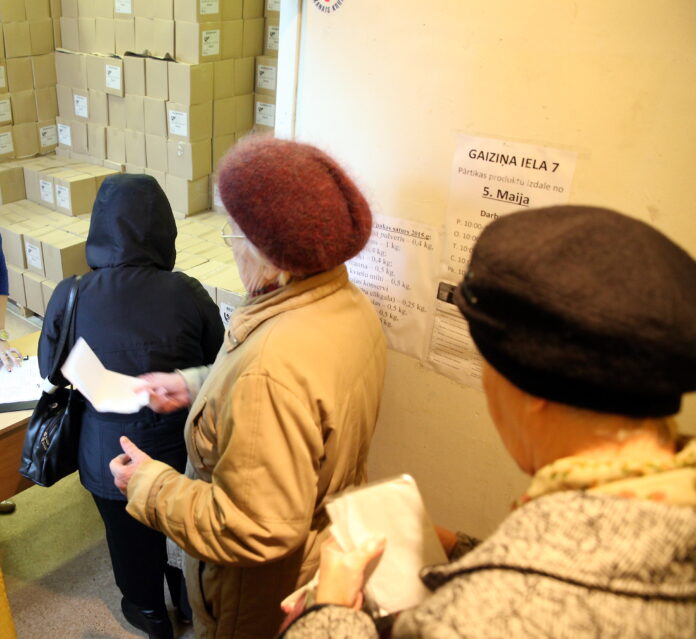Opinion piece by Ilona Bērziņa
Latvia is in dire need of a Poverty Law. Otherwise the next time the government requires additional funds to cover the holes in the budget caused by excessive spending, it will be difficult to imagine just how underprivileged a person needs to be properly provided by the state.
The decision to cut low-income people from any aid in the form of food parcels is irresponsible and pathetic. The line that separates a low-income person from a poor person is very thin, and it is entirely possible that the aforementioned food parcels that have allowed these people to stay afloat until now. Now only poor people will receive food parcels. Them, Latvian residents and Ukrainian refugees who have ended up in an emergency situation. On top of that, the number of food parcels for them was divided by zero – the poor will only receive one food parcel package per quarter instead of two.
The tragedy is that nearly all the finances provided to Latvia by European Social Fund Plus (ESF+) are nearly all out, but the Ministry of Finance has sent the only pillar of support for socially unprotected people – Ministry of Welfare (I say this without any irony) – to go about its business. This means there is no money for the poor – tighten your belts and peek into your savings jar.
First of all, we have to understand who are these wealthy low-income people who are no longer eligible to receive oil, canned meat, wheat flour, sugar, tea, oat flakes, and, perhaps, a piece of soap. These are the people whose monthly income does not exceed EUR 411 (for the first or sole person in a household).
And now some good news – the wages of Saeima deputies will not be frozen and their wage growth will be limited to 2.6% next year! As Saeima speaker Daiga Mieriņa put it – a single fantastically thoughtful decision! As you can imagine, if the already meager wages of parliamentary deputies – EUR 4 220 before taxes – are frozen, as Mrs. Mieriņa put it: “In the future there could be a situation when the wages of deputies grow so sharply, that it would require a disproportionately high rise for Saeima’s budget.” (The monthly salary of deputies, as well as officials of state and municipal institutions, is determined on the basis of the basic monthly salary and applying a coefficient to it. In turn, the calculation of the basic salary is based on the increase in the average wage in the country.)
Hearing about these figures, as well as the almost two hundred thousand euro “militarized composition” at the base of the National Armed Forces in Ādaži, the gift of half a billion euros to airBaltic, who knows how many billions for the ongoing Rail Baltica construction, one would think that we live in Fairyland and have the ability to manage our ports, national airlines, railways, and our country’s natural wealth will soon overtake Dubai. Unfortunately, this “dream statistics” suffers from the existence of those approximately fifty five thousand, up to sixty thousand in winter months, who require aid every month. The 22.5% of Latvian residents who are subjected to a risk of poverty in 21st century Europe are still here. These figures are from 2022, but I don’t think the situation has improved by much since then.
Considering all this, putting a hand in the savings of the second pension pillar of the population, albeit by only one percentage point, is simply criminal. On the other hand, there is also a positive here – people finally clearly see that the 18 000 signatures they had collected in record time against changes in pension levels do not make the slightest difference in the eyes of the ruling coalition. On top of that, according to results of a survey by Citadele Bank, in which 77% of Latvian residents are against this initiative.
Because, you know, Saeima elections are far away, but the holes in the budget need patching now.
Appealing to their conscience will not help. If the situation does heat up too much, however, they will find some scapegoat to pin the blame. Rather, the long-standing practice of the German Taxpayers’ Federation (Bund der Steuerzahler) should be implemented in Latvia and every year the taxpayer should compile and publish a report in the “Black Book” on the taxpayers’ money wasted on strange and ineffective projects.
It is worth mentioning that this year marks the 52nd time this report was published. We could go further – attach the photo of the official responsible for failed and wasteful projects. For example, post the photos of Minister of Defence Andris Sprūds and NBS Commander Leonīds Kalniņš next to the photo of the CRV (T) APC; Rail Baltica’s bridge supports could serve as the background for photos of at least three last Ministers of Transport with Kaspars Briškens in the centre. Then there is the study of Wolt and Bolt courier experience that cost 300 thousand euros. The list goes on. It is also worth mentioning that German people’s tolerance of such wasteful expenses is considerably lower – they start “boiling” at the 3 000 euros mark. Perhaps the time has come for Latvia to understand that all of these “military compositions” and other wonders are financed by the money taken directly from our pockets. (A special thanks to Māris Puķītis, whose article on jauns.lv inspired me to touch on the topic of taxpayers’ Black Book).
Also read: 183 thousand euros for a “composition”: were Latvia’s Minister of Defence and Army Commander truly oblivious?
Follow us on Facebook and X!
Source link : http://www.bing.com/news/apiclick.aspx?ref=FexRss&aid=&tid=67215f22b0aa417783feb5883431f3a3&url=https%3A%2F%2Fbnn-news.com%2Fopinion-saeima-deputies-spend-money-while-the-poor-stay-hungry-262023&c=3629091760418872168&mkt=de-de
Author :
Publish date : 2024-10-29 04:01:00
Copyright for syndicated content belongs to the linked Source.
